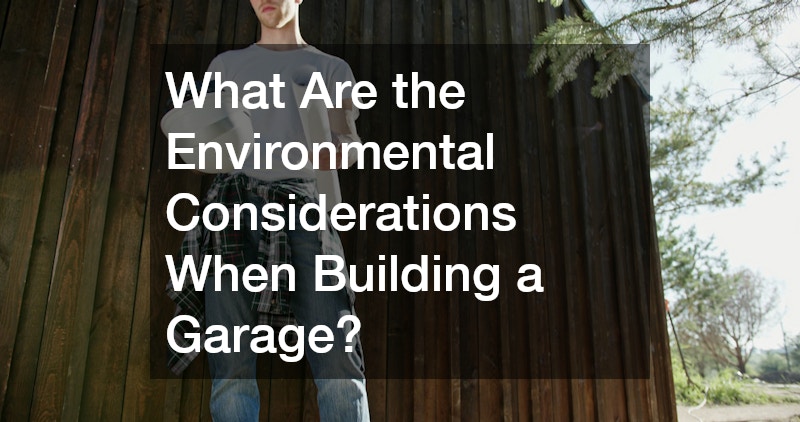For many homeowners, the idea of a garage separate from house is appealing — and for good reason. A detached garage offers flexibility, added functionality, and the potential to increase the value of your property. But it’s not just about picking a spot and starting construction. Building a garage separate from house involves careful planning, understanding local regulations, and making design choices that complement your home while meeting your needs.
From additional storage to enhanced curb appeal, a standalone garage can transform how you use and enjoy your property. But it’s not without its challenges. Factors like building codes, zoning laws, and long-term maintenance must be considered. You’ll also want to think about utilities like electricity and plumbing, as well as security and environmental impact.
Whether you’re thinking of creating a home workshop, protecting your vehicles, or simply adding more storage, this guide will walk you through everything you need to know before starting. We’ll also touch on related considerations, like integrating sheds, using drain cleaning service professionals if plumbing is involved, and planning for water damage restoration in case of future leaks or flooding.
Let’s explore the benefits, costs, and design tips for building a garage separate from house.
What Are the Key Benefits of Building a Standalone Garage?

Additional Storage Space
One of the main reasons people opt for a garage separate from house is the additional storage it provides. Not only can you store vehicles, but you can also use the space for tools, seasonal décor, sports equipment, and even create a small workshop. Some homeowners also incorporate sheds for even more storage solutions.
Unlike sheds, however, a detached garage is more substantial and can be tailored to meet specific needs, such as housing larger equipment or even serving as an art studio or home gym.
Enhanced Vehicle Protection
A garage separate from house still serves its primary purpose: protecting your vehicles from the elements. Snow, rain, and hail can wreak havoc on your car’s paint and functionality. Detached garages often provide better ventilation than cramped attached garages, reducing moisture buildup and the need for water damage restoration later.
Some homeowners choose to install robust garage doors or work with garage door companies to find doors that provide superior insulation and security.
Potential for Added Property Value
A well-designed garage separate from house can increase your property’s resale value. Buyers often appreciate the added storage and aesthetic appeal. Investing in quality materials, stylish garage doors, and even minor landscaping improvements around the garage can enhance curb appeal significantly.
How Do Building Codes and Zoning Regulations Affect the Project?
Understanding Local Building Codes
Before breaking ground, you must familiarize yourself with your local building codes. These regulations ensure your garage is safe and compliant with structural requirements. If you’re adding electrical or plumbing, you may also need to consult plumbers or drain cleaning service experts to ensure everything meets code.
Zoning Regulations and Property Lines
Zoning laws often dictate where you can build a garage separate from house. They specify setbacks, height limits, and minimum distances from property lines. You might also need to check if you can legally install additional sheds or garages.
Permit Processes and Requirements
Applying for the proper permits is essential. Many municipalities require you to submit plans and wait for approval before starting construction. Skipping this step could lead to fines or having to tear down your new garage.
What Are the Cost Considerations for a Detached Garage?
Estimating Construction Costs
The cost of building a garage separate from house can vary widely, depending on size, materials, and location. On average, expect to spend between $20,000 and $50,000. Custom designs, premium garage doors, and upgraded finishes can drive costs higher.
Budgeting for Additional Features
If you’re adding electrical outlets, plumbing for a sink, or special ventilation systems, your costs will rise. Hiring plumbers, garage door companies, and even specialists for garage door services may be necessary.
Long-Term Maintenance and Upkeep Costs
Don’t forget ongoing maintenance costs. Garage doors need periodic service, and it’s wise to keep contact information for local drain cleaners or water damage cleanup services handy in case of unexpected leaks or drainage issues.
How Do I Choose the Right Location for the Garage?

Proximity to the Main House
Choosing the right spot for your garage separate from house involves balancing accessibility with aesthetics. Too far away, and it becomes inconvenient; too close, and it might block natural light or create awkward spaces in your yard.
Accessibility and Driveway Planning
Make sure the garage is easy to reach, even in poor weather. A well-designed driveway, possibly serviced by local garage door companies for an automatic gate or door system, ensures you can use the garage comfortably year-round.
Impact on Landscaping and Yard Design
Consider how your new garage will affect your landscaping. Will you need to remove trees, relocate sheds, or redesign garden beds? Planning ahead prevents unnecessary headaches.
What Are the Design Options for a Separate Garage?
Architectural Styles and Aesthetics
Your garage separate from house should complement your home’s architecture. Whether you choose a rustic barn look, a sleek modern design, or something more traditional, it should feel like a natural extension of your property.
Interior Layouts and Functionality
Plan the interior layout carefully. Do you need space for a workshop, gym, or extra storage? Proper planning will help you avoid clutter and make the most of the space.
Material Choices and Sustainability
Materials impact both durability and environmental footprint. Using sustainable materials and working with reputable garage door companies to source energy-efficient doors can help reduce your impact.
What Should I Consider for Electrical and Plumbing Needs?
Electrical Wiring and Outlet Placement
If you plan to use power tools or install an EV charger, you’ll need adequate wiring and outlets. Consult an electrician early on to avoid costly changes later.
Lighting and Security System Options
Good lighting is critical, both inside and outside. Motion-detecting lights and security cameras can deter theft and make the garage safer at night. Many garage door services now offer integrated smart home security options.
Planning for Plumbing and Additional Utilities
If you’re adding a sink, bathroom, or even a utility area, you’ll need plumbers or a drain cleaning service to handle the pipes and drainage correctly.
How to Ensure Proper Insulation and Ventilation?

Insulation Materials and Techniques
Proper insulation keeps your garage comfortable year-round and protects against moisture. It also prevents pipes from freezing if plumbing is installed. Insulating walls, ceilings, and garage doors can make a significant difference in both energy efficiency and comfort. Some homeowners also opt for spray foam insulation because it fills every crevice, providing superior air sealing. Remember that working with experienced professionals — whether contractors or even garage door services — ensures you get the best materials and installation techniques for your specific climate and design. Investing in high-quality insulation reduces heating and cooling costs and extends the life of your garage.
Ventilation Solutions for All Seasons
Without proper ventilation, a garage can become damp and prone to mold. Louvers, vents, or even a dedicated HVAC system might be necessary. Good ventilation helps prevent harmful fumes from building up if you work on cars or use paint and chemicals inside. Roof vents, ridge vents, and exhaust fans can all help air circulate effectively. For garages with plumbing, proper ventilation also helps prevent excess humidity, reducing the chance you’ll need water damage cleanup down the road. Consult plumbers and HVAC experts to determine the best configuration for your garage separate from house.
Protecting Against Moisture and Mold
Waterproofing measures are essential. If leaks occur, having contact info for water damage restoration or water damage cleanup professionals can save you a lot of stress. Apply sealants on concrete floors and weatherstripping around doors to keep water out. A properly sloped driveway can also prevent water from pooling near the entrance. Installing a dehumidifier and maintaining your drainage systems — possibly with help from drain cleaners or a drain cleaning service — will protect your investment. Regularly inspect the garage for signs of dampness, mold, or mildew and address problems immediately before they spread.
What Security Measures Should Be Taken?
Installing Security Systems
A garage separate from house is often more vulnerable to break-ins. Installing a dedicated security system with alarms and cameras is a smart move.
Lighting and Physical Barriers
Strategically placed lighting and sturdy garage doors enhance security. Many garage door companies offer high-security options that resist forced entry.
Integrating Cameras and Monitoring Tools
Smart cameras and motion sensors can be linked to your phone for real-time monitoring. This is especially helpful if you store valuable items in your garage or adjacent sheds. Many systems also include cloud storage, enabling you to review footage anytime. Placing cameras at entrances, around garage doors, and along pathways creates a comprehensive security perimeter. If you already have garage door services or plumbers working on your property, ask them about additional security options you can include during construction or renovation to minimize disruption.
How to Plan for Future Expansion or Modifications?
Designing with Future Needs in Mind
Even if you don’t plan to expand now, design your garage so it can adapt to future needs. This might include space for a second story, extra bays, or even living quarters. Leaving room for plumbing or electrical upgrades can save money and hassle later. A garage separate from house is often easier to expand than an attached one, so plan wisely. Consulting with architects, plumbers, and garage door companies early in the design phase can help ensure your structure can handle future changes.
Modular and Expandable Construction Techniques
Using modular construction allows you to add on easily later. Many sheds and garage structures today are designed to be expanded without starting from scratch. Modular walls, trusses, and roofing systems make it simple to increase square footage or reconfigure the layout as your needs evolve. Even elements like garage doors can be upgraded down the line with help from garage door services. Planning for modularity upfront makes your detached garage a more flexible, long-term investment.
Legal Considerations for Alterations
Before making any changes later, check your local regulations again. Adding plumbing or electrical lines often requires updated permits and inspections. You may also need new approvals for expanded footprints, especially if you plan to increase the height or add a second floor. Some municipalities require water damage restoration and fire safety plans when making significant upgrades. Keeping good records of prior work, including any drain cleaning service or pipe repair services you’ve used, will help streamline future permitting and maintenance.
What Are the Environmental Considerations When Building a Garage?

Green Building Practices
Consider environmentally friendly practices, such as recycled materials or green roofs. This not only benefits the planet but can also save you money in the long run. Materials like reclaimed wood, low-VOC paints, and energy-efficient garage doors reduce environmental impact while enhancing the garage’s durability. Many garage door companies now specialize in eco-friendly products, including insulated doors that improve energy efficiency. Thinking sustainably also means planning for efficient water use, perhaps by installing rain barrels or permeable pavers near your garage separate from house.
Impact on Local Ecosystem
Building a garage separate from house can disturb local habitats. Plan landscaping to minimize the impact and perhaps even support pollinators or native plants.
Energy Efficiency in Garage Design
Energy-efficient windows, doors, and insulation reduce energy consumption. Many garage door services now offer insulated, energy-rated garage doors that contribute to overall efficiency. Adding solar panels to your detached garage roof can help offset energy costs while reducing your carbon footprint. High-efficiency lighting, HVAC systems, and proper insulation materials make your garage comfortable and sustainable. If plumbing is included, consulting plumbers on low-flow fixtures or water-saving appliances also helps conserve resources.
Conclusion
Building a garage separate from house is an exciting and rewarding project when done thoughtfully. Not only does it provide extra space for vehicles, storage, or hobbies, but it can also boost your home’s value and curb appeal. By planning carefully — from understanding building codes to choosing sustainable materials — you can avoid common pitfalls and create a space that truly enhances your lifestyle.
Don’t overlook the importance of good security, proper ventilation, and future-proof design. Enlist professionals when needed, such as plumbers for utility work, garage door companies for high-quality installations, and water damage restoration experts if unforeseen problems arise. Don’t forget about the smaller details, like integrating sheds for added storage and choosing the right garage doors that suit both function and style.
Ultimately, a garage separate from house offers a unique opportunity to tailor your property to your exact needs while creating a functional and beautiful space. Whether you’re protecting vehicles, adding a workshop, or simply increasing storage, this type of project can be a worthwhile investment that benefits you for years to come.

